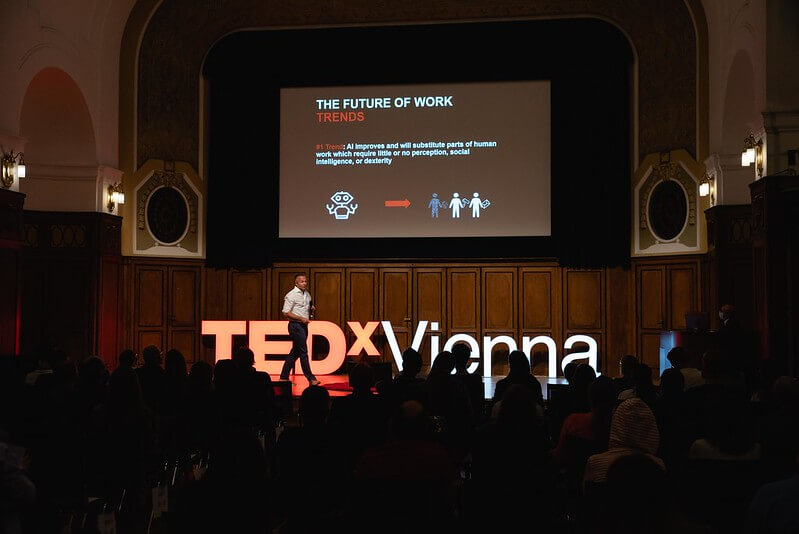Professor for strategic management Markus Reitzig is an organizational scientist and scholar well known for his innovative ideas and predictions for the future of work organizations. Markus studied both law and chemistry before transitioning into business, where he obtained his PhD in Business Economics. Markus has published numerous articles on his research in notable journals. Following his insightful talk on the future of organizational structures in the workforce, at TedxVienna’s Adventures Within, I had the chance to interview Markus and learn more.
In your talk, you discussed the potential of flat organizations taking over in the future, but not without challenges. Could you maybe elaborate on what these challenges might be?
The negatives are obvious I guess, they’ll be sort of shadow structures emerging, where somebody would not officially be delegated a lot of authority to do certain things, but people will be jostling for power, they will try to influence team members, and I think that is a major challenge that needs to be overcome. So, how can you avoid certain people trying to build up a lot of de facto power which is not legitimized by what peers signed up for in the first place? Power that is not legitimized by superior competence, superior experience, superior sense of fairness, but power that really stems from somebody being politically astute – I think that’s a major challenge.
As a consequence of this, there will be the problem of people forming subgroups, polarizing issues in order to attract people to their camps, trying to exclude others. So then, we are talking about the biases of including and excluding, which is majorly problematic.
And on top of that, an additional challenge to be managed will be sort of “not getting lost”. It’s a nice thing to care about maximal information aggregation, so that lots of people are in the know of everything that’s going on, but that’s also costly. If everybody is involved in every type of discussion, then it’s easy to get distracted. So, these teams need to find ways in which they rely on decentralized information exchange and allow other people to have privileged information, that might be more effective.
So we’re talking power considerations, and as a consequence of power considerations we’re talking group biases and we’re talking information cost issues, and I think those are the big challenges with flat organizations.
As your career path ended up differently than you had initially imagined it, would you have any advice for students who are just starting out and aren’t sure where they see themselves in the future work world just yet?
I don’t feel I am in a position to give anybody advice beyond what their preferences are, but one thing is pretty clear: if you feel that there is a routine canon of things that you can learn that are not extremely difficult for machines to imitate, it is very likely that you will face problems in the short- to mid-run. At the same time though, you need to make a choice and specialize in something, so I think those two considerations should be on the minds of everyone. You can’t believe that if you study a little bit of this and then a little bit of that and have no profound depth in any of the domains, you will be interesting to the workforce, because the frontier of where things are happening is deep and involves a lot of detail. At the same time though, to believe that you can go deep once, acquire some skills that allow you to carry out something really well, and then just keep reiterating a complicated routine is also extremely misleading. So then, what’s the consequence? I think the thing that’s least likely to be substituted is recombination of knowledge aka creativity. This is going to remain a human domain for quite some time, so you need to have skills for recombining knowledge, that means mastering methods in social science that allow you to do so. Another thing is to choose one domain in which you love to go deep, one that you really want to embrace in life.
 Other than with work organizations, do you have any additional predictions about the future of work that you would like to discuss?
Other than with work organizations, do you have any additional predictions about the future of work that you would like to discuss?
Whenever you put these presentations together you immediately wonder “am I getting it completely wrong?”, and my answer to this is yes, most likely yes, at some point. The question is “at which point am I going to get these things wrong?”. So when I’m talking about economic inequality right now, unless certain things happen, the younger generation won’t be able, as much as I regret this, to buy a city apartment in Vienna, given the real estate prices. It may as a matter of fact be that there will be a tipping point though, when people will no longer tolerate this. So I guess if there is anything relevant about the future of work that I haven’t discussed today, it’s that these trends, while very robust right now, may have a tipping point eventually. The question for me is, when will this happen? Because one thing is very likely: it will happen at some point. Just when economic inequality can’t rise anymore because people won’t take it anymore, or when world populations won’t grow anymore because the planet doesn’t want to take it anymore, that I find extremely difficult to discuss. For now, I think within a given time frame, there’s no other thing that I would consider to be super important in the context of work that would be at the same level of importance as the things that we discussed before. What really should bother us is, when will there be the inflection point to what we’re currently seeing.
Before business, you studied chemistry and then law, was there a reason for this? Could you explain the process which led you to switch study paths and eventually end up in the field of business?
Yes, that’s true, there definitely was a reason for that, and mine is actually really mundane. I studied chemistry in the beginning because I was very much driven by the idea (and that was in the 1990s) that one could engage in sustainable production and make the world a better place through chemistry. Naïve, ain’t it? Then I realized that no one is interested in sustainable production, so I thought, well, why don’t I study law, at least I can help create frameworks, to potentially make sustainable and better production long-lasting, to implement it. It took me a long time to realize that if you really want to understand how certain things change in the world and affect such change, you need to become a social scientist. You won’t be able to prescribe it, and you won’t be able to force it through with technology alone. So why don’t you start slowly, with understanding how the world works when humans interact with one another. So I made the transition to business because it was the most obvious thing at the time. And what I personally find so interesting is to learn about what organizations and companies can tell you about human interaction. Then I ended up in the domain of organizational science, the domain in which we try to understand how different agents, human agents, come together with one common goal to try to achieve things. And that to me is still the most fascinating thing, so that’s the story.
For more information, visit www.markusreitzig.com
Make sure to watch his full TEDxTalk from TEDxVienna’s Adventures Within Work!
Header image & photo by Marlon Hambrusch






Hi my name is Erica, I want to ask one question.
Based on the talk, can you explain two potential problems that exist in organizations when facing changes in future work?